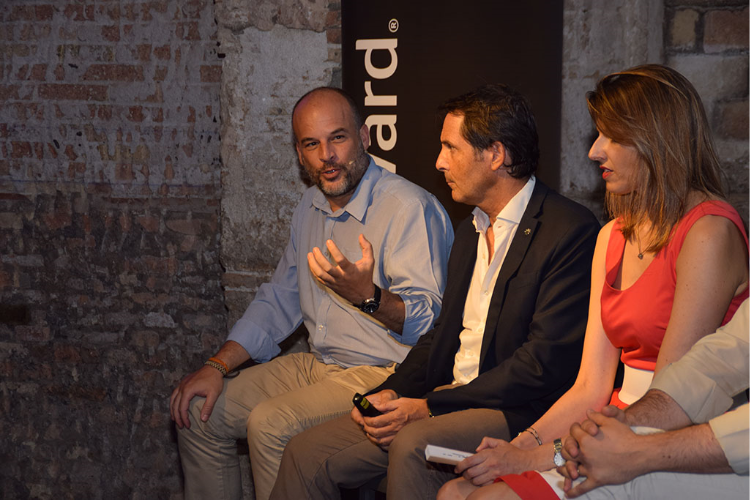This is one of the principal conclusions of the first study on using hospitality in the service sector, was elaborated jointly by brand consulting firm Branward and Ramon Llull University’s School of Tourism and Hospitality Management Sant Ignasi (HTSI).

Even though two out of every three Spanish brands claim to be customer-oriented, 51% of businesses fail to work on improvement processes for optimizing their relationship with customers. This is one of the principal conclusions of the first study on using hospitality in the service sector, presented on July 19 at La Fàbrica Moritz in Barcelona with the collaboration of Club Marketing. The report, entitled “De la atención al cliente a la hospitalidad” (From customer service to hospitality — available for download in PDF), was elaborated jointly by brand consulting firm Branward and Ramon Llull University’s School of Tourism and Hospitality Management Sant Ignasi (HTSI).
Understanding how brands see and work on hospitality, establishing lines of action for improving Hospitality Culture and offering a positive experience to customers are the most important goals of this study. Carlos Puig Falcó, President of Branward/Member of the Board of Directors of Club Marketing Barcelona, and Ricard Santomà, Dean of HTSI, were in charge of presenting the study, which shows the need for businesses to focus more on improving customer service:
- 50%have not defined their Customer Journey.
- 40%have not identified points of contact.
- Almost 20%are unaware of their customers’ motivations.
- 90%do not have a co-innovation program with customers.
- 77%do not have a customer loyalty program.
The importance of including hospitality culture in organizations
Ricard Santomà presented those in attendance with an in-depth idea of the importance of including Hospitality Culture in organizations: “hospitality is the tourism sector’s great contribution to society. It isn’t a strategy, it’s a public value based on a contagious attitude that can transform people. In the words of Lluis Marcó, the former director of several important hotels in Barcelona, we are custodians of people’s happiness.” Santomà also reminded the audience that we need to create spaces within businesses in order to make this attitude possible. “Hospitality requires empathy, and constantly listening so that we can put ourselves in the other person’s shoes”, affirmed Santomà. In the opinion of Branward President Carlos Puig, “the Brand-customer relationship has evolved, and today what is important isn’t what you do for a customer, it’s how you make them feel. The world of hotels works thanks to this hospitality. And when we talk about hospitality, we’re talking about emotions, experiences and people.”
Other conclusions of the study are that 46% of brands do not offer personalization of their products for customers, and only 22% have improvement plans for opening up new channels for interacting with customers. In this regard, the report also shows that traditional ways of interacting with customers have changed with the rise of new technologies: email is now the principal means of communication between brands and customers (80%), followed by social networks (67%).
Lluis Torra, Director of Club Marketing, welcomed those attending the presentation and moderated the round table discussion involving Patricia González, Head of Customer Care at Vueling; Gabriela Riveccio, Marketing & Promotion Director at Barcelona Turisme; Jordi Marzo, Director of Operations at the Cacheiro Group; and Sandra Sancho, Director of Marketing at Mytaxi and Member of the Board of Directors of Club Marketing Barcelona. All participants agreed that hospitality must be a part of the DNA of each business in order for it to help them forge a relationship of trust with the customer. According to Gabriela Riveccio of Barcelona Turisme, it is very important for companies to put themselves in customers’ shoes: “if you try to understand peoples’ state of mind and the conditions that create them, you can create a foundation for your hospitality and offer the best service. Hospitality stirs emotions and it isn’t easy to manage, but if you make it a part of your business culture you can work on the three Rs: reputation, repetition and recommendation.”
Jordi Marzo, Director of Operations at Cacheiro and former HTSI alumnus, feels that there is plenty of work to be done on a business level involving hospitality. “the concept of hospitality involves a certain degree of complicity, because it’s based on attitudes and experiences. The company needs to transfer the values of Hospitality Culture as hosts, and we in the tourism sector need to encourage companies from different sectors to increasingly take on this special attitude”, explained Marzo.
From customers service to hospitality, areas to improve
According to the study, being customer-oriented means being aware of their level of satisfaction, their perception of value, the quality of products/services and the trust deposited by customers in the brand. Hospitality goes one step further than being customer-oriented, and it involves not only a proactive attitude by the brand to create dialogue with customers, it involves considering three levels: spatial welcome, verbal welcome and emotional welcome. Revising the Customer Journey and the variables that generate trust in a brand, increasing the reception of feedback, personalizing the experience and innovating in the interaction with customers through new channels are some of the areas for improvement proposed by the study on the impact of hospitality in business activities.
“De la atención al cliente a la Hospitality” is the result of a qualitative and quantitative investigation. On the one hand, a focus group with 10 company executives was formed to establish the foundations of what is currently understood as hospitality in the tourism sector. On the other, a survey of branding, marketing and communications directors from sectors like travel, tourism, distribution, restaurants, automobiles, energy, finance or health was conducted to evaluate customer service. The survey, carried out online with a total of 21 questions, received 203 answers from managers and took place between May 17 and June 12, 2017.










